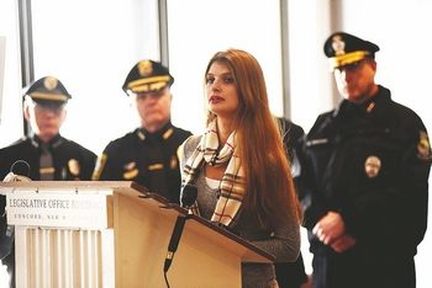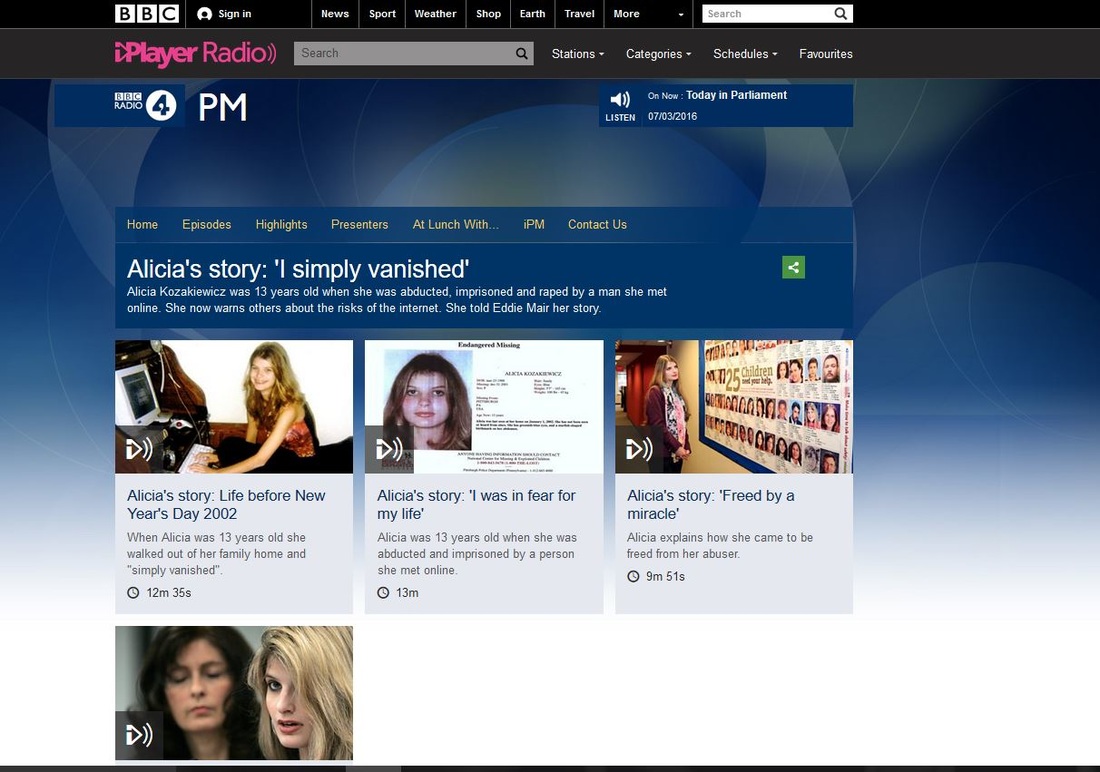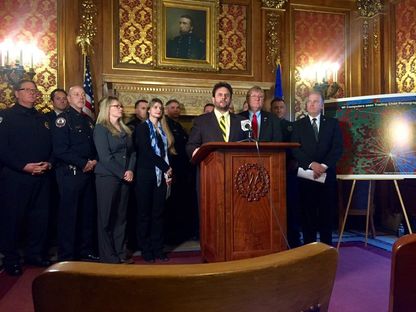 By Dave Solomon State House Bureau Alicia Kozakiewicz speaks at a news conference about Alicia’s Law in Concord on Tuesday. (DAVID LANE/UNION LEADER) CONCORD — A woman who was held for four days chained in a basement dungeon by a sadistic sexual predator joined New Hampshire lawmakers in appealing to the Legislature and the public for support of Alicia's Law, which would appropriate $250,000 to the Internet Crimes Against Children Task Force. Alicia Kozakiewicz, now 28, was 13 when she was kidnapped. “I was groomed and lured from my Pittsburgh home by a predator who held me captive in Virginia, where I was raped and beaten and tortured,” she said in an interview before a news conference in the Legislative Office Building. “But thankfully and miraculously I was rescued. After a period of healing, and at the age of 14, I started to speak out about my situation and work to save other children and families.” Kozakiewicz travels the country in support of the Alicia Project, which supports funding in the battle over internet crimes against children. She was in New Hampshire to testify on behalf of bills that have been introduced in the House and Senate to appropriate $250,000 in state funds for the New Hampshire Internet Crimes Against Children Task Force. The $250,000 state appropriation each year of the two-year budget would be matched by federal funds, increasing task force funding by $500,000 each year. The task force is currently funded with a $265,000 grant from the Department of Justice. “This would enable the task force to do highly technical and sophisticated work, to have the hardware and software they need to track down crimes against children that are occurring on the internet,” said State Sen. Martha Fuller Clark, D-Portsmouth, lead sponsor of the bill in the Senate. Kozakiewicz said it was a miracle that she was saved. “He was sharing my degradation and abuse online,” she said. “Someone saw this and came forward to law enforcement. It was a total and absolute miracle. Every child deserves that miracle. Every child deserves to be given a second chance at life.” Kozakiewicz pointed to a map of northern New England with 2,700 red dots that mark the general locations of computers police believe are being used to upload or download child pornography. “Fifty-five percent of these dots are hands-on predators, meaning real children right now are being hurt as I was … real children who need to be rescued,” she said. The New Hampshire task force has been in place for nearly 20 years, said Portsmouth Police Chief David Mara, formerly of Manchester, but it could do much more with the additional funding, including training new officers and acquiring new equipment. “I have had the opportunity to look at some of these images,” he said, “and it is pure evil.” If the bills pass, New Hampshire would become the 13th state to adopt Alicia’s Law and have a dedicated funding stream to combat internet crimes against children. Kozakiewicz described the officers who monitor the internet and do the tough work of the task force as “super heroes.” “This is so much more than a job to them,” she said. “This is personal. But they don’t have the resources they need to go out and save these children, and that’s what Alicia’s Law provides. “It provides a cape for our super heroes, because that’s what they are. The law enforcement agents who rescued me are my angels. They saved my life and gave me a second chance. Every child deserves that chance.” [email protected] Full story: http://www.unionleader.com/state-government/Kidnapped-at-13-woman-testifies-in-support-of-funding-for-internet-task-force-02012017 ANNAPOLIS, Md. --Legislation under consideration in Maryland would use unclaimed lottery proceeds to pay for training and equipment to help law enforcement investigate online child sex offenders.
Alicia's Law is named for Alicia Kozakiewicz, who survived being kidnapped, raped, tortured and chained in a basement dungeon for days. In 2002, Scott Tyree struck up a chatroom friendship with then 13-year-old Alicia. He abducted her outside her parents' house in Pittsburgh and imprisoned her in his northern Virginia townhouse basement. "I was chained, tortured, raped and had my denigration shared online through streaming video by this sadistic pedophile," Kozakiewicz said. "I was a 90-pound, bruised and beaten little girl who cried for my mommy and daddy, and I prayed that somebody would just find and rescue me. I may have been rescued, but the child that I was is still chained in that basement." Federal agents using a provision of the PATRIOT Act managed to pinpoint Tyree's computer. He's serving a 19-year sentence. "It is one thing to experience abuse, but to see it through your abuser's eyes is unimaginable, and to know that others watched it for their own sick pleasure will haunt me forever," Kozakiewicz said. "There are just too many predators out there." Kozakiewicz is on a mission to help law enforcement, whom she refers to as her rescue angels, and victims. She's in Annapolis testifying in favor of legislation that establishes the Internet Crimes Against Children Task Force Fund. "Our workgroup found that less than 2 percent of the sexual child exploitation cases are investigated, because our state law enforcement doesn't have the technical expertise," said Sen. Susan Lee, D-Montgomery County. The first $3 million in unclaimed state lottery prize money each year will provide grants to support law enforcement training and buy equipment. "No one wants Maryland to be the state where predators know that they won't be caught, because we don't have the funds to stop them," said Delegate Brooke Lierman, D-Baltimore City. A portion of the fund also goes to programs that help victims. "Children advocacy centers need these resources to be able to provide the hope and the healing so that children can grow up and have a future and productive lives," said Adam Rosenberg, with the Baltimore Child Abuse Center. "For most of those Maryland children, there will be no rescue. There will be no knock at the door, no angels, because law enforcement in Maryland, just like in every other state, is overwhelmed and outnumbered," Kozakiewicz said. Kozakiewicz's journey also includes completing a master's degree and she's engaged to be married. Alicia Kozakiewicz was 13 years old when she was abducted, imprisoned and raped by a man she met online. She now warns others about the risks of the internet. She told Eddie Mair her story.
Click link or image below to listen to the interview. http://www.bbc.co.uk/programmes/p03lbz5c_  Wisconsin State Representative John Nygren and Senator Alberta Darling Wisconsin State Representative John Nygren and Senator Alberta Darling One more step towards "Alicia's Law" saving children's lives in Wisconsin! It passed out of the Joint Finance Committee unanimously tonight. Thank you, Representative Nygren and Senator Darling! "Alicia's Law" is now on its way to the floor for a final vote. Watch the Alicia's interview on Dr. Drew HLN in the video below.
PITTSBURGH (KDKA) — Police say a 13-year-old girl in Virginia was abducted and stabbed to death.
It’s a case that hits close to home for a woman from Pittsburgh because she survived a similar nightmare. “Nicole’s case, I hear it, and I think, ‘Wow, that could have been me,’” said Alicia Kozakiewicz from her home in Chicago, where she has been closely following the case of Nicole Lovell. Police say Virginia Tech students Natalie Keepers and David Eisenhauer planned the murder of Lovell, whom he met online. Investigators say they found messages from him on her phone. Investigators say Eisenhauer killed her the same day she climbed out of her bedroom window to meet him. “Our cases are different, but they’re also very similar,” said Kozakiewicz. Kozakiewicz was also 13 when she befriended someone online, never imagining it was a 38-year-old man. He took her to his home in Virginia where he tortured and raped her in his basement. Four days later, the FBI tracked them down and rescued her. “When this happened to me, this was 2002, so the Internet was very different,” said Kozakiewicz. “I had the big old desktop in the family room and that was pretty much it. Nowadays, kids have their mobile devices with them at all times and predators have access to them at all times.” Kozakiewicz has made it her mission to tell her story to kids and to lobby for laws to protect young people. Now she’s wondering if she had spoken at Lovell’s school, whether she could have made a difference. Her advice to parents is this: “It’s sad, but they need to invade their kids’ privacy,” said Kozakiewicz. “And I know that’s a very precious thing, but their safety is so much more important.” CBS News reports that Nicole Lovell told friends she was using an anonymous messaging app to connect with an 18-year-old man. As for Kozakiewicz, she will graduate with a Master’s degree in forensic psychology and plans on getting married later this year in Pittsburgh. Alicia Kozakiewicz was 13 years old when she slipped out of home to meet someone she had been chatting to online. What followed was a nightmare. But Alicia has made it her mission to protect other children from what she went through, and has had a law named after her. Alicia's Law has now been adopted by several states in the US, and is designed to promote funding for teams that go in search of children who have gone missing after being groomed on the internet. Alicia tells Jo Fidgen why she's now campaigning for the rest of the states to take it up.
Listen to the interview here: http://www.bbc.co.uk/programmes/p03ggdg7 Wisconsin lawmakers move quickly on bill aimed at fighting internet crimes against children1/13/2016 Wisconsin lawmakers are moving quickly to pass a bill that would expand law enforcement officers' ability to investigate and prosecute those who commit internet crimes against children.
The bill, introduced Monday, would create a dedicated revenue source to fund the state Department of Justice's Internet Crimes Against Children task force and includes a provision designed to speed up the process through which investigators can track down the source of the criminal activity. The effort is part of a national push to create dedicated funding sources at the state level for law enforcement units that deal with child exploitation. This bill, like similar ones in other states, is called Alicia's Law. The legislation is named for Alicia Kozakiewicz, who survived being abducted and sexually abused on film when she was 13. Kozakiewicz, who now advocates for internet safety, was at the state Capitol Wednesday with bill authors Rep. Joel Kleefisch, R-Oconomowoc, and Sen. Van Wanggaard, R-Racine, and Attorney General Brad Schimel. The bill was given a public hearing in Senate and Assembly committees on Wednesday. Under the bill, any person in Wisconsin convicted of a crime would be required to pay an internet crimes against children surcharge — $20 for a misdemeanor conviction and $40 for a felony conviction. Schimel said the surcharge would generate an estimated $2.2 million in funding. The bill would also allow the attorney general, or his or her designee, to issue an administrative subpoena to an internet service provider to compel the provider to release information that could aid an investigation of internet crimes against a child. Kozakiewicz was found because her captor, whom she had met in an internet chat room, broadcast footage of her being sexually abused and a viewer recognized her photo from a missing person photo. The viewer tipped the FBI, and officials were able to identify her abuser by his IP address. She was rescued after four days. Time is of the essence in these situations, she and Schimel said, arguing the subpoena power can help shorten the time it takes to track down an IP address and determine which county's law enforcement agency should take the case. The attorney general could request the subpoena be kept confidential until all relevant documents were produced, and the internet service provider would be able to go to court to try to limit or quash the subpoena. The bill has bipartisan support, but several Democrats on the Assembly criminal justice committee questioned the creation of the surcharge. Rep. Evan Goyke, D-Milwaukee, questioned why the bill didn't request the funds come from a budget appropriation instead, noting that money from the state budget would be more reliable as a steady funding source than someone recently convicted of a crime. Kleefisch said he would be happy to introduce a budget amendment requesting state funds in the next budget cycle, but argued the bill wouldn't make it to Gov. Scott Walker's desk this session if the funds were requested that way now. "It's a priority for me ... to get it to the governor's desk," Kleefisch said. "This is one of the most steadfast, quickest ways to do that." The Department of Justice estimates at least 4,000 internet connections in Wisconsin are used to trade child pornography, Schimel said. By: Jessie Opoien, The Capital Times Read full article: http://host.madison.com/ct/news/local/govt-and-politics/wisconsin-lawmakers-move-quickly-on-bill-aimed-at-fighting-internet/article_33506ad9-dbf4-56c6-bc85-fd6b4010ce53.html
MADISON (WKOW) – State lawmakers and authorities are joining a national push to fight crimes against children online.
Committees in the State Assembly and State Senate discussed Alicia's Law at the State Capitol on Wednesday. The bill is named after Alicia Kozakiewicz, a woman who was abused by a pedophile after being lured by an internet predator when she was 13. Officials say it would give authorities a source of money from the state to find and arrest pedophiles. “We owe it to our children to do all we can to prevent predators from getting their hands on children, and to end the suffering of those who are already being abused,” said Wisconsin Attorney General Brad Schimel. “The child that I was is still chained in that room, and is still suffering,” said Alicia Kozakiewicz. “But I am here and I am alive today because child rescue teams like the Wisconsin Internet Crimes Against Children Task Force existed.” Right now, a version of Alicia's Law is in place in seven states. The bills being proposed in Wisconsin would need to pass the Senate and Assembly committees before going up for a full vote
By: Carissa Casarez
Read full article: http://www.wkow.com/story/30960601/2016/01/13/lawmakers-and-state-authorities-make-push-for-alicias-law-in-wisconsin |
Archives
June 2017
|




 RSS Feed
RSS Feed






